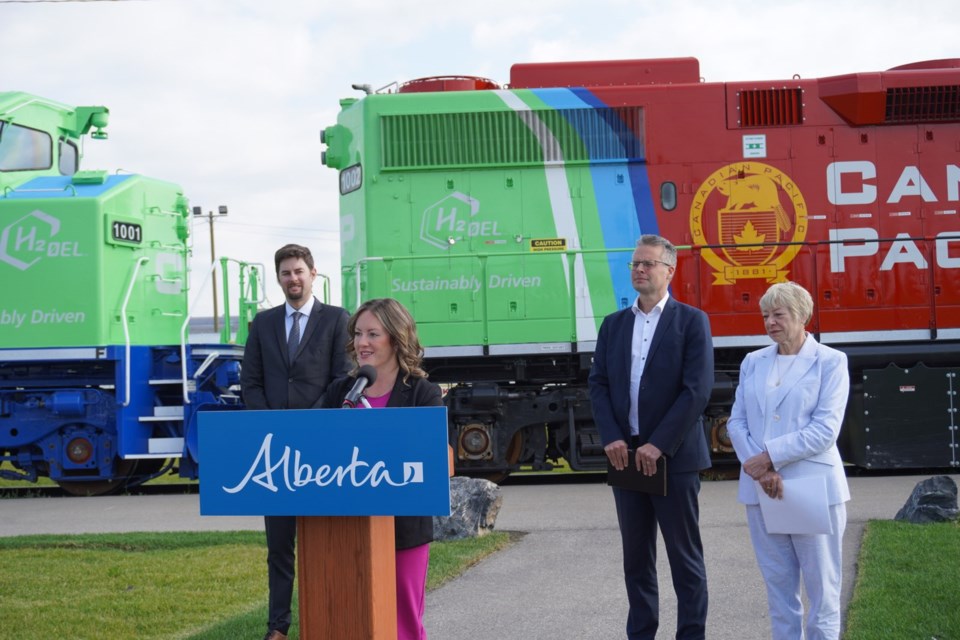Scott Hayes | [email protected]
Local Journalism Initiative Reporter
It's a really exciting time to be in Alberta’s Ministry of Environment and Protected Areas, says Rebecca Schulz, the minister in charge.
"We have so many amazing things going on," she said during her interview with the 51°µÍø on Tuesday right before she was in Calgary to announce two new hydrogen funding competitions launching in the province.
Earlier this spring, the UCP government released its emissions reduction and energy development plan, which she called a great opportunity to be able to outline the work that's being done in Alberta and "make sure that we have a strong, sustainable energy industry, as well as a diverse economy for generations to come."
She discussed the mandate letter that was given to her by Premier Danielle Smith three weeks ago. It contains 13 bullet points – a generous workload for any ministry – though matters of purely environmental concern seemed secondary.
Several times, industrial concerns and collaborations with the minister of Energy and Minerals demonstrated themselves as the real focus of her portfolio.
Opining that Alberta is one of the most beautiful places in the world, she said her role in government is to maintain Alberta's higher environmental standards but not to the detriment of the economic growth that must also be nurtured. It's not a matter of one over the other though.
"We can absolutely do both," she said.
"There is a lot of work to do in environment and my mandate letter has a lot of things that require my attention. There are a lot of things that are complex, everything from oil sands mine water management to land-use planning to rolling out our emissions reduction and energy development plan, water reclamation certificates.
“There's quite a lot going on here. It's going to take consulting with partners, and of course other ministries to get this done very quickly, but I'm excited and the work matters for the future of our province."
It might be that consultation that proves to be the underlying key to the success of the ministry's work. Her background as a communications professional should serve well in her collaborations with Brian Jean, the minister of Energy and Minerals, which is mentioned four times out of the 13 bullet points in her mandate letter.Â
Her mandate also states her directive to work with Matt Jones, minister of Jobs, Economy and Trade, to develop a ministry-specific job-attraction strategy.
She is also tasked to work with the Ministry of Intergovernmental Relations led by Premier Smith to defend Alberta’s energy interests against federal overreach and develop strategic alliances with other provinces to deal with environment-related issues.
Other collaborations with other levels in government and various industries as well as First Nations are also mentioned.
Everything is connected, even in government work, Schulz said, which is why Premier Smith emphasized those collaborations.
She added that the government wants to see the energy industry grow.Â
"We've been talking about diversification for years. It's more diverse today than it ever has been before, and so we want to continue to see growth and jobs, and our major industries flourish. But we also want to reduce emissions.Â
“That work means working really closely with the minister of Energy and Minerals to make sure that can happen and that we're reporting the emissions reduction that's happening and setting goals alongside Energy and obviously taking feedback from industry."
It's the same thing with oilsands mine water management and addressing tailings pond reclamation concerns up in northern Alberta.Â
"This is something that obviously we are the lead on, but of course it will require working with industry, working with Indigenous communities, consulting with Indigenous communities, and of course, working with the federal government to address this issue and find some solutions. But you know what, we can't do it without also working with industry."
Schulz said she wants to make sure that Albertans know that the government is committed to the stewardship of this amazing province while also seeing our major industries flourish.
"I think part of that is making sure that the federal government does not infringe on areas of provincial jurisdiction. A lot of what we've been discussing in the first couple weeks in the role is things like the clean electricity regulations and a potential proposed cap on our oil and gas industry, which is something we absolutely can't support," she said, adding, "We absolutely cannot hit the reductions that they're talking about by 2030."Â
"And even the plastics ban. This federal overreach is having the exact opposite effect on what we're trying to do here."
The federal government has not stepped up with its commitments to funding for clean technology and emissions reduction innovation. Alberta has been waiting on that for two years "but without those investments, the technology isn't going to be ready in time."
In the meantime, the world continues to use more oil and gas than many other countries and coal development is increasing.
Alberta, Schulz said, has the solution to what the world needs when it comes to energy security, reliability and affordability, which is "the top-of-mind issue for all Albertans and all Canadians right now."Â
"We can do that. We can be a leader in Canada when it comes to sustainable energy development and emissions reduction. It's not an either/or: we can do both."




